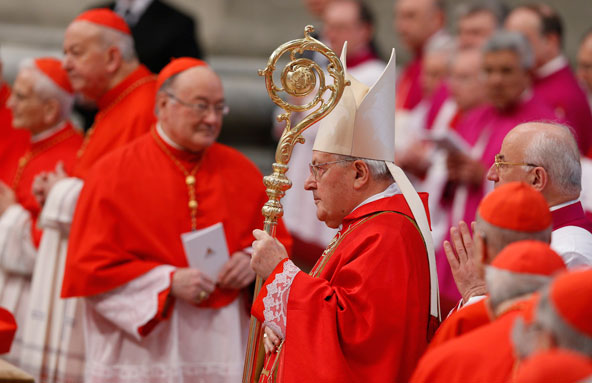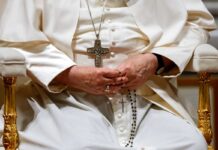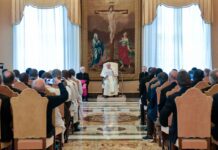
VATICAN CITY (CNS) — Hours before the start of the conclave that will choose the next pope, the dean of the College of Cardinals celebrated the papacy as a source of unity among Catholics and of evangelization and charitable service to the world.
Christ “has established his apostles and among them Peter, who takes the lead, as the visible foundation of the unity of the church,” Cardinal Angelo Sodano said in his homily at St. Peter’s Basilica March 12. “Each of us is therefore called to cooperate with the successor of Peter, the visible foundation of such an ecclesial unity.”
Cardinal Sodano, 85, concelebrated the Mass “Pro Eligendo Romano Pontifice” (for the election of the Roman pontiff) with some 170 other cardinals, including 115 under 80 who would be entering the conclave in the Sistine Chapel that afternoon.
At the start of the Mass, as a choir and the congregation chanted verses from the psalms, the cardinals processed up the main aisle of the basilica, wearing vestments in the red of Pentecost, signifying their invocation of the Holy Spirit to guide the papal election.
Cardinal Sodano’s homily included words of thanks for the “brilliant pontificate” of Pope Benedict XVI, which prompted more than 30 seconds of applause.
The cardinal quoted the retired pope’s description of charity as a “constitutive element of the church’s mission and an indispensable expression of her being,” and his warning that charity must not be reduced to “solidarity or simply humanitarian aid,” since the “greatest work of charity is evangelization, which is the ‘ministry of the word.'”
Christ’s “mission of mercy,” Cardinal Sodano said, “is especially entrusted to the bishop of Rome, shepherd of the universal church.”
“The last popes have been builders of so many good initiatives for people and for the international community, tirelessly promoting justice and peace,” the cardinal said. “Let us pray that the future pope may continue this unceasing work on the world level.”
Given its timing, the homily at the cardinals’ last Mass before a conclave is commonly interpreted as an exhortation to the cardinal-electors on the priorities they should follow in choosing the next pope.
On the same occasion in 2005, the cardinal dean gave a now-famous sermon that warned believers against trends in contemporary culture, particularly a “dictatorship of relativism that does not recognize anything as definitive and whose ultimate goal consists solely of one’s own ego and desires.” He emerged from the Sistine Chapel the next day as Pope Benedict XVI.
Cardinal Sodano’s words could also prove influential, but he is too old to vote in this conclave, and while the cardinal electors are permitted to choose someone from outside their number, the last time they did so was in 1378.
— By Francis X. Rocca Catholic News Service






